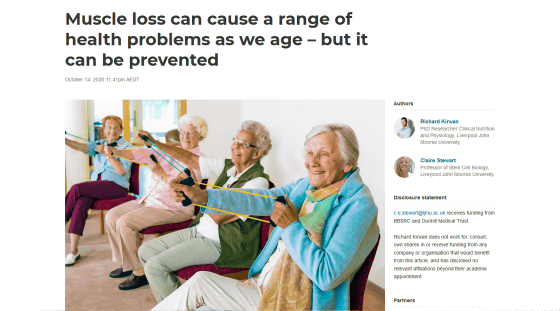What kind of health problems do muscles weaken due to aging?

Muscle loss can cause a range of health problems as we age – but it can be prevented
https://theconversation.com/muscle-loss-can-cause-a-range-of-health-problems-as-we-age-but-it-can-be-prevented-147882

'Muscle mass plays a major role in our health,' Kirwan said. Loss of muscle mass and increased fat are associated with a variety of health conditions, including heart disease, diabetes, and dementia. Pointed out. Even for people who already have heart disease, those with high muscle mass are more likely to live longer than those without it, and those with very low muscle mass are at high risk of premature death due to various factors. ..
These results indicate that muscles may play a protective role in heart health, but there are many uncertainties as to why muscles protect people from diseases such as heart disease. is. According to one theory, a chemical called myokine, which is released in response to muscle contraction, may reduce inflammation throughout the body and provide various protective effects.
Another benefit of muscle, Kirwan cites, is that it reduces the risk of developing diabetes. When humans eat carbohydrates such as bread and rice, sugar enters the bloodstream and most of it is sent to the muscles. Muscle uses this sugar as energy or stores it as glycogen to maintain stable blood sugar levels. This process plays an important role in controlling blood sugar levels, so people with less muscle are more likely to develop diabetes .

When elderly people lose muscle, daily activities such as walking with luggage and climbing stairs become difficult. In addition, the difficulty of exercising can lead to a negative cycle of less activity and more muscle loss. It has also been found that reduced physical activity interferes with the mechanism for maintaining bone strength and increases the risk of osteoporosis .
In addition, although it is common for food intake to decrease with age, protein intake functions as a signal for muscle growth, so a decrease in protein intake due to a decrease in food intake also leads to a decrease in muscle mass. Kirwan pointed out.
In older people, muscle mass-related hormones such as testosterone and estrogen are less secreted, body fat percentage is higher, insulin resistance to regulate blood sugar levels worsens, and levels of inflammation in the body increase. All of these factors combine to make it easier to lose muscle than young people.
In addition, Kirwan argues that the pandemic of the new coronavirus infection (COVID-19), which requires refraining from going out and restricts movement, can also contribute to the loss of muscle mass in the elderly. When the stress caused by the pandemic is combined with the disorder of eating habits and the decrease of the amount of exercise, there is a risk of further loss of muscle mass.

Loss of muscle mass in older people causes a variety of problems, but Kirwan commented, 'Muscle loss can be prevented or delayed by some lifestyle changes: exercise and diet.' .. Lifting dumbbells, exercising with training tubes, and taking a walk will help maintain muscle.
It's also important to eat protein-rich foods such as lean meats, fish, eggs, and low-fat dairy products. Taking at least 25-40g of protein with each meal and supplementing nutrients such as vitamin D , fish oil , and creatine with supplements can help older people retain more muscle, Kirwan said. ..

Related Posts:
in Science, Posted by log1h_ik







